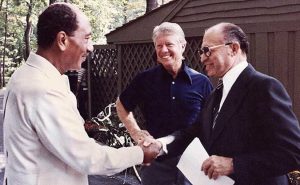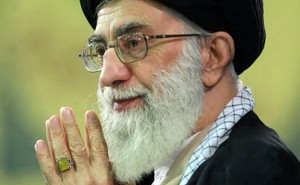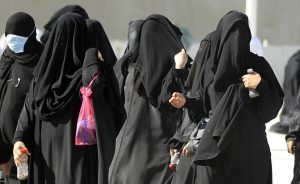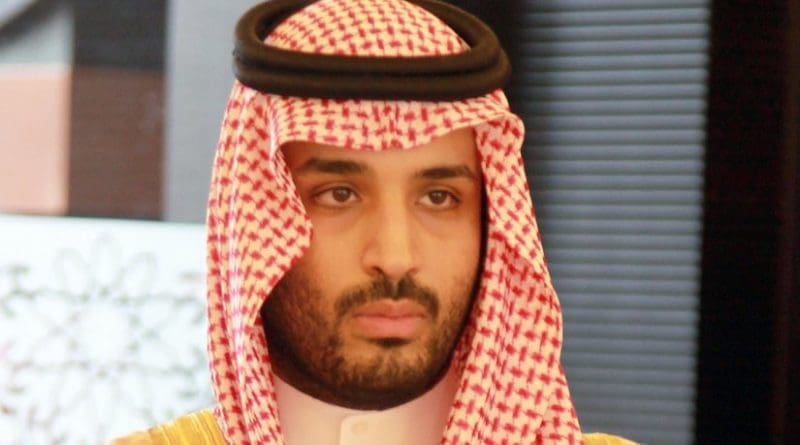Mohammed Bin Salman ‘Officially’ Recognizes Israel And Demonizes Iran – Analysis
“Unlike any other Saudi official, Saudi Crown Prince Mohammed Bin Salman is openly extending a hand to the Israelis, despite knowing that he will be on the hit list of extremists in the Muslim world.”
To say that Saudi Crown Prince Mohammed Bin Salman (MBS) is blunt is truly an understatement through and through.
During his recent visit to the US he gave the reputable magazine The Atlantic an interview in which he did not mince his words and spoke candidly on a host of issues never brushed upon, any time before, by a Saudi official, let alone a prince.
For many observers this prince is truly “a riot” and an unconventional Arab politician.
For some political analysts, on the other hand, he is a man “formatted” by Americans to reform the traditional and patriarchal Middle East, while for the emasculated youth of the region, he is an inestimable hope to enter modernity at long last.
Will he succeed?
In his above-mentioned interview, he dealt openly with a number of taboos and walked bravely into no-go areas, mainly:
- Recognition of Israel,
- Recalcitrant Iran,
- Bothersome religious Fundametalism
- Guardianship of women, etc.
Recognition Of Israel
MBS is the very first Gulf Arab leader to recognize the existence of Israel on its “own land”i officially. This is a real first worth taking note of and follow up. He declared clearly:
“I believe that each people, anywhere, has a right to live in their peaceful nation. I believe the Palestinians and the Israelis have the right to have their own land. But we have to have a peace agreement to assure the stability for everyone and to have normal relations.”
And went on to say:
“Our country doesn’t have a problem with Jews. Our Prophet Muhammad married a Jewish woman. Not just a friend—he married her. Our prophet, his neighbors were Jewish. You will find a lot of Jews in Saudi Arabia coming from America, coming from Europe. There are no problems between Christian and Muslims and Jews. We have problems like you would find anywhere in the world, among some people. But the normal sort of problems.”
In the past all those who tried to come close to this country were eliminated physically: President Anwar Sadat. He paid with his life on October 6, 1981 his historic visit to Israel on November 19, 1977. Nevertheless, the visit shook the status quo and led to the Oslo Accord between the Palestinians and The Israelis; According to Efraim Karsh, writing recently in The Jerusalem Post, the visit was undeniably fruitful:ii
“As it turned out, the visit proved to be the most important single political event in the history of the Arab-Israeli conflict, culminating in the Egyptian-Israeli peace treaty of March 1979 and the attendant shattering of the Arab world’s uniform rejection of Jewish statehood. And while Sadat’s successor, Hosni Mubarak, held a far more restrictive view of the agreement, the Israeli-Egyptian peace has successfully weathered many regional crises (from the 1982 Lebanon war, to the “al-Aksa Intifada,” to the 2014 Gaza conflict), paving the road to the October 1994 Israel-Jordan peace treaty and the yet-to-be-completed Israeli-Palestinian peace process launched with the September 1993 Oslo accord.”
However one wonders why on earth is MBS recognizing Israel without anything in return? What is the gain? Well, actually, Saudi Arabia has something in return: the Israeli nuclear umbrella and the determination of the latter to strike at Iran sooner or later, with the help of the US. Up to now Saudi Arabia and Israel were bound by a “cold” allianceiii that was in the closet but now has come out into the open dramatically:iv
“Israel is a big economy compared to their size and it’s a growing economy, and of course there are a lot of interests we share with Israel and if there is peace, there would be a lot of interest between Israel and the Gulf Cooperation Council countries and countries like Egypt and Jordan”.
MBS needs Israel to fight the Iranian looming danger in the region. Iran has a massive, well-trained army and most of all probable nuclear capabilities. In the past, Saudi Arabia used to admonish any Arab country that befriended directly or indirectly Israel, which was referred to in the official rhetoric as kiyan sahyouni i.e. “Zionist entity” and, of course, not recognized as a full country. Politicians who made friends with Israel were either killed: President Anwar Sadat, or labeled as traitors: King Hussein of Jordan and King Hassan of Morocco and attempts to kill them were foiled by their able intelligence institutions.
So, unlike any other Saudi official MBS is openly extending a hand to the Israelis. Of course he knows that he will be on the hit list of every extremist there is in the Muslim world as well as that of Iran and its handy men, cronies and client states.

MBS is undeniably scared to death by the Mullahs of Iran and their secret plans to take control of his country. He is right when he says that the Iranians want to control the world, he actually meant the Muslim world. They made it clear from the very beginning of their revolution in 1979 to want to export their ideology, religion and might to the rest of the Muslim world. In this they are no different from the Saudis, who, themselves used their money to export Wahhabismv to the rest of the Muslim world and vestiges of that still exist today. MBS knows that and he is lying about that flat. Saudi Arabia was well behind al-Qaeda and a myriad of other organizations bent on spreading fundamental Islam by means of coercion and terror, but they failed utterly.vi
Their failure is indeed double: firstly, many foreign Muslim organizations took their money and delivered nothing and may Muslim countries showed publicly allegiance but hated the guts of Saudis and laughed at their gullibility. Secondly, Saudi Arabia squandered billions of dollars on an educational system that was mainly religious in curriculum, philosophy, approach and finality, and ended up spawning more extremism instead of kick-starting any scientific renaissance in the country, in the least.
Today Iran is close to making an atomic bomb that will allow it to become a member of the nuclear club and what is more, it is, also, able to manufacture its own weapons and has, somewhat, become self-sufficient in many other areas, while Saudi Arabia is dependent on the West and the rest of the world for all its armament and everything else.
Today, more than ever, Saudi Arabia is feeling alone and fragile. The Arabs cannot help. Its army is handicapped and its performance in Yemen is below the average, not to say really catastrophic. In the past, Saudi Arabia relied on Egypt for protection, today Egypt is totally entangled in its own domestic problems with the army busy keeping the lethal Salafists at bay.
In this environment, Saudi Arabia needs Israel to do the donkey work, not to say the dirty work for it: strike and cripple Iran and probably allow the rise of a liberal government in lieu of the Mullahs, but this is easily said than done. Israel would need America to undertake the suicidal mission of régime change in this country. Besides the regular army, most of the defensive work will fall on the Revolutionary Guards, a lethal army that has for mission regime protection, not to forget the Basij (eleven-million strong paramilitary volunteer militia.)vii The war on Iran is not going to be a leisurely stroll but a bloody campaign that would destabilize the whole region and put at risk oil production.
Saddam in his “whirlwind war” against Iran also known as Qadisiyyat Saddam: “Qadisiyyat Saddam, a deliberately emotive reference to the famous Arab victory over the Persians in the seventh century”viii in the words of Ian Black, Middle East editor, of The Guardian newspaper. This deadly war lasted eight years 1980-1988 and both Iraq and Iran paid a dear human cost (over one million lives) and a high material price (billions of dollars) with no result whatsoever.
Is Iran A Rogue Nation?

For MBS Iran is a rogue country that wants “to control the world,” this is a figure of speech (exaggeration) accepted in Arab rhetoric with the expressive intent to deliver a stern message but does not make sense elsewhere. Iran and Saudi are engaged in a deadly feud to control the Muslim world since 1979, if not before. Israel is part of the picture because it has its own agenda for controlling the Middle East and removing, sooner than soon, an existential threat that is Iran. The United States wants to protect Israel, in the first place as well as its vital interests in the region.ix
MBS says that Khameini is worse than Hitler:x “I believe that the Iranian supreme leader makes Hitler look good.”, this is, obviously, another exaggeration to get the Europeans on board, a task which would be difficult to achieve, not to say impossible, because they all have economic interests in Iran and besides Iran did not commit any atrocities or crimes against humanity, as it were. On the contrary, it helped the West topple Saddam.
In his demonization of Iran, MBS goes on to say forcefully:xi
“But the supreme leader is trying to conquer the world. He believes he owns the world. They are both evil guys. He is the Hitler of the Middle East. In the 1920s and 1930s, no one saw Hitler as a danger. Only a few people. Until it happened. We don’t want to see what happened in Europe happen in the Middle East. We want to stop this through political moves, economic moves, intelligence moves. We want to avoid war.”
If both America and Israel engage in a war against Iran, would Saudi Arabia finance totally the onslaught? Does it have the means or would it be tempted, yet again, to round the rich of the country, quarantine them in the Ritz Carlton Hotel, once more, and demand payment for their release? Would this work again if undertaken?
Fundamentalism

In the interview with The Atlantic, MBS seems to deny that the Saudi state has actually adopted Wahhabism as state religion since its creation in 1930 and that the establishment has since duly sponsored hundreds of religious associations and organizations that were entrusted with spreading austere Islam worldwide.
The local chapters of Wahhabism still exist today and function according to action plans previously laid out by these state institutions.
“No one can define Wahhabism. There is no Wahhabism. We don’t believe we have Wahhabism. We believe we have, in Saudi Arabia, Sunni and Shiite. We believe we have within Sunni Islam four schools of thought, and we have the ulema [the religious authorities] and the Board of Fatwas [which issues religious rulings]. Yes, in Saudi Arabia it’s clear that our laws are coming from Islam and the Quran, but we have the four schools—Hanbali, Hanafi, Shafi’i, Maliki—and they argue about interpretation.”
His denial does in no way take away the responsibility from the state for adopting this tribal form of Islam: austere and inhuman. Criminals had no fair trial and some of them were executed publicly by severing their heads with swords: a practice reminiscent of the Middle Ages. Women are kept away from public space and have to wear an integral veil called khimar. They could not drive and could not travel without male guardianship maharim, who could even be an underage son. These strict rules and many more were enforced by a religious police or rather a vice squad called mutawwa’ which on behalf of the state, enforces Sharia law in respect to religious behavior (morality) and is, often, seeing beating people, in public, for failing to go to prayer on prayer times.
Everybody knows for sure that current fundamentalism became a powerful Islamic current after the Iranian revolution of 1979 that brought Shiism to prominence and power.
Afraid of the world repercussions of the Shiite Islamic school of thought, the Saudis empowered their state organizations such as: رابطة العالم الاسلامي Rabitat al-‘alem al-Islami (World Islamic League), founded in 1962 by, the then, Crown Prince Faisal bin Abdul Aziz Al Saud.
The Oxford Dictionary of Islamxii says that “the group has acted as a mouthpiece for the Saudi Arabian government, which finances it.” The organization propagates the religion of Islam, encouraging Da’wah and conversion of non-Muslims, and promotes apologetics against criticism of Islam. The organization funds the construction of mosques, financial reliefs for Muslims afflicted by natural disasters, the distribution of copies of the Quran, and political tracts on Muslim minority groups.
Since coming to power MBS, under pressure from the US, is trying to repel this austere form of Islam by allowing women to drive and to go to such public spaces as football stadiums, but he has still a lot to do to shed fundamental religion for good.
The reforms undertaken by this young statesman are a revolution, a massive revolution that will change the socio-religious landscape of the whole Middle East and by extension the Muslim world. As such, things that were taken for granted, for ages, as corruption, embezzlement, power abuse, patriarchy, male domination, etc. will have to cease to make room, later on, to some form of democracy in a prelude to the end of oil bonanza. MBS’s Vision 2030xiii is an ambitious action plan to sever dependency of the country on oil.
MBS Shock Treatment
MBS wants a modern Saudi Arabia not in appearance only such as food, dress, idiom, but, mainly, in belief and practice of modernity, equality and equity. To achieve this goal, dear to him, he chose the shock treatment approach. Will he vanquish the dark forces of tradition, tribalism and patriarchy to drag Saudi Arabia fully into the third millennium or will he fail and things will return to reactionary Arab normality, after all the Arab Spring withered in spite of many youth uprisings in the whole Middle East?
Only time can show and tell.
You can follow Professor Mohamed CHTATOU on Twitter: @Ayurinu
Endnotes:
i. https://www.theatlantic.com/international/archive/2018/04/mohammed-bin-salman-iran-israel/557036/
ii. http://www.jpost.com/Opinion/Sadats-visit-513437
iii. https://www.eurasiareview.com/10082017-the-saudi-israeli-covert-cold-alliance-analysis/
iv. https://www.theatlantic.com/international/archive/2018/04/mohammed-bin-salman-iran-israel/557036/
v. https://en.wikipedia.org/wiki/Wahhabism
vi. https://www.eurasiareview.com/11032017-is-iran-a-confirmed-nemesis-of-the-middle-east-oped/
vii. Robin B. Wright, ed. (2010), The Iran Primer: Power, Politics, and U.S. Policy, US Institute of Peace Press, pp. 62–65, ISBN 1601270844
viii. https://www.theguardian.com/world/2010/sep/23/iran-iraq-war-anniversary
xix. https://www.eurasiareview.com/25042017-the-great-power-play-of-the-greater-middle-east-analysis/
x. https://www.theatlantic.com/international/archive/2018/04/mohammed-bin-salman-iran-israel/557036/
xi. Ibid
xii. http://www.oxfordislamicstudies.com/article/opr/t125/e1652
Rabitat al-Alam al-Islami. Founded in 1962 in Saudi Arabia to discuss the affairs of the Muslim ummah in view of the threats posed to the Muslim world by Communism and irreligion. The intent was to promote the message of Islam, fight perceived conspiracies against Islam, and discuss all problems relevant to Islam. After 1972 it stressed a supranational, independent identity and concentrated on establishing a network of Islamic cultural and political organizations. During the 1970s it expanded activities in missionary work, jurisprudence, and social welfare. The group has acted as a mouthpiece for the Saudi Arabian government, which finances it. Since the beginning it has sought to establish a jurisprudence council entrusted with the elaboration and control of internationally accepted standards of Islamic law.
xiii. http://vision2030.gov.sa/en
Our Vision is a strong, thriving, and stable Saudi Arabia that provides opportunity for all. Our Vision is a tolerant country with Islam as its constitution and moderation as its method. We will welcome qualified individuals from all over the world and will respect those who have come to join our journey and our success.
We intend to provide better opportunities for partnerships with the private sector through the three pillars: our position as the heart of the Arab and Islamic worlds, our leading investment capabilities, and our strategic geographical position. We will improve the business environment, so that our economy grows and flourishes, driving healthier employment opportunities for citizens and long-term prosperity for all. This promise is built on cooperation and on mutual responsibility.
This is our “Saudi Arabia’s Vision for 2030.” We will begin immediately delivering the overarching plans and programs we have set out. Together, with the help of Allah, we can strengthen the Kingdom of Saudi Arabia’s position as a great nation in which we should all feel an immense pride.
Mohammad bin Salman bin Abdulaziz Al-Saud
Chairman of the Council of Economic and Development Affairs
Further Reading:
Abir, Mordechai (1987). Saudi Arabia in the oil era: regime and elites : conflict and collaboration. ISBN 978-0-7099-5129-2.
Abir, Mordechai (1993). Saudi Arabia: Government, Society, and the Persian Gulf Crisis. ISBN 978-0-415-09325-5.
Al-Rasheed, Madawi (2010). A History of Saudi Arabia. ISBN 978-0-521-74754-7.
Bowen, Wayne H. (2007). The History of Saudi Arabia. ISBN 978-0-313-34012-3.
Hegghammer, Thomas (2010). Jihad in Saudi Arabia: Violence and Pan-Islamism Since 1979. ISBN 978-0-521-73236-9.
House, Karen Elliott (18 September 2012). On Saudi Arabia: Its People, Past, Religion, Fault Lines—and Future. Alfred A. Knopf. ISBN 0307272168.
Long, David E. (2005). Culture and Customs of Saudi Arabia. ISBN 978-0-313-32021-7.
Malbouisson, Cofie D. (2007). Focus on Islamic issues. ISBN 978-1-60021-204-8.
Otto, Jan Michiel (2010). Sharia Incorporated: A Comparative Overview of the Legal Systems of Twelve Muslim Countries in Past and Present. ISBN 978-90-8728-057-4.
Golkar, Saeid. (2012) Paramilitarization of the Economy: The Case of Iran’s Basij Militia, Armed Forces & Society, Vol. 38, No. 4
Golkar, Saeid. (2015) Captive Society: The Basij Militia and Social Control in Iran. Woodrow Wilson Center Press and Columbia University Press
Iran’s Basij Force – The Mainstay Of Domestic Security, By Hossein Aryan, RFERL, December 07, 2008
“Basij Militia” (2 December 2011) The New York Times”. Retrieved 10 November 2014.
“The Arab world fears the ‘Safavid'”. Jerusalem Center For Public Affairs. Retrieved 10 November 2014.

